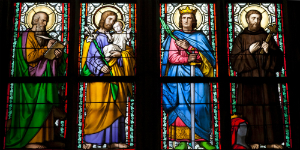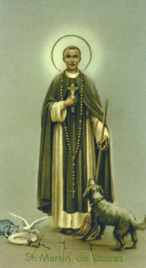We ask you, humbly: don't scroll away.
Hi readers, it seems you use Catholic Online a lot; that's great! It's a little awkward to ask, but we need your help. If you have already donated, we sincerely thank you. We're not salespeople, but we depend on donations averaging $14.76 and fewer than 1% of readers give. If you donate just $5.00, the price of your coffee, Catholic Online School could keep thriving. Thank you.Help Now >
Bishop urges West Virginians to promote healing of body, mind, spirit
FREE Catholic Classes
WHEELING, W.Va. (CNS) - In the first pastoral letter of his episcopacy, Bishop Michael J. Bransfield of Wheeling-Charleston called for an intense, in-depth focus on health and well-being in West Virginia and challenged communities across the state to heed God's mission of healing body, mind, heart and spirit.
Highlights
Catholic News Service (www.catholicnews.com)
10/26/2006 (1 decade ago)
Published in Health
Bishop Bransfield promulgated the letter, "A Church That Heals," at an Oct. 18 Mass at the Cathedral of St. Joseph in Wheeling on the feast of St. Luke, physician and evangelist. At a press conference following the Mass, Bishop Bransfield also announced that $400,000 of diocesan funds has been designated as seed money to help expedite local response to health care initiatives highlighted in the letter. In his homily, the bishop said he realized early in his episcopacy that West Virginia suffered from "a reality of poverty and the desperately poor health of many of our people." Calling attention to the staggering statistics of the state, Bishop Bransfield noted that the adult population of West Virginia leads the nation in high blood pressure and arthritis; has the second highest cholesterol levels in the nation; has the third highest rate of obesity; and has the fourth highest rate of adult-onset diabetes. Combined with the high levels of tobacco use and physical inactivity, he said, West Virginia is ranked 46th in terms of life expectancy and leads the nation in loss of teeth by age 65. "The statistics relating to the health of our children and to childhood illness are even more troubling," Bishop Bransfield said. "We must find new and dynamic ways to be a church that heals while preserving the tried and true ways; we must reach out not only to cure illness but to encourage health; we must reconnect with that ancient goal of striving for a fruitful, spiritual life that arises from a sound mind in a healthy body." In his pastoral letter, Bishop Bransfield said the church must inspire partnerships to build healthier communities, with the following goals: - The church must be a credible witness of healthy living through word and action. - The laity must own the problems and the solutions for creating environments where health and well-being might be possible for all. - The special needs of youth for safe activities, of the elderly for companionship and of the environment for continued and improved stewardship must be met. - "The irony, if not the hoax, of public policies that give with one hand and take with the other" must be addressed. - People must be empowered to take charge of their own health and to have a stake in the health of others. - Churches must serve as a resource for health and well-being. /p> A transportation system that does not rely solely on the individual automobile must be promoted. Bishop Bransfield said he wanted the letter to offer direction and make only limited concrete recommendations so each parish, school and institution in the diocese could decide how best to become a church that heals in their unique circumstances. Acknowledging the statistics that describe the ill health and unhealthy behaviors and the geographic, economic and cultural obstacles to accessing healing services of all types in West Virginia, Bishop Bransfield urged the faithful to recognize those most vulnerable to these conditions. "We have seen an erosion of the life and vigor of Christ's mission of healing," he said. "It is too simplistic to call a health crisis of major proportions in our state a matter of self-infliction, unintended victimization or circumstantial collateral damage." The Diocese of Wheeling-Charleston is a longtime provider of health and health-related services in West Virginia, with three hospitals, serving 495,000 patients a year; homes for dependent adolescents and the elderly, which help more than 750 people a year; and 17 school-based health centers. Catholic Community Services is second to the state in providing social services, administering Medicaid programs to 308 people annually; child-family health services to 1,850 people annually; services to nearly 400 developmentally delayed children each year; food nutrition services to 5,300 people a year; health clinics serving 4,300 children a year; child day care centers that serve 6,800 children annually; food banks that serve nearly 71,000 people a year; and many other programs. Editor's Note: "A Church That Heals" is available on the Web at www.dwc.org/health.
---
Copyright (c) 2007 Catholic News Service/U.S. Conference of Catholic Bishops
Join the Movement
When you sign up below, you don't just join an email list - you're joining an entire movement for Free world class Catholic education.
-

-
Mysteries of the Rosary
-
St. Faustina Kowalska
-
Litany of the Blessed Virgin Mary
-
Saint of the Day for Wednesday, Oct 4th, 2023
-
Popular Saints
-
St. Francis of Assisi
-
Bible
-
Female / Women Saints
-
7 Morning Prayers you need to get your day started with God
-
Litany of the Blessed Virgin Mary
Daily Catholic
 Daily Readings for Sunday, November 03, 2024
Daily Readings for Sunday, November 03, 2024 St. Martin de Porres: Saint of the Day for Sunday, November 03, 2024
St. Martin de Porres: Saint of the Day for Sunday, November 03, 2024 Prayer to St. Martin de Porres: Prayer of the Day for Sunday, November 03, 2024
Prayer to St. Martin de Porres: Prayer of the Day for Sunday, November 03, 2024- Daily Readings for Saturday, November 02, 2024
- St. Victorinus of Pettau: Saint of the Day for Saturday, November 02, 2024
- Daily Prayer For The Holy Souls: Prayer of the Day for Saturday, November 02, 2024
![]()
Copyright 2024 Catholic Online. All materials contained on this site, whether written, audible or visual are the exclusive property of Catholic Online and are protected under U.S. and International copyright laws, © Copyright 2024 Catholic Online. Any unauthorized use, without prior written consent of Catholic Online is strictly forbidden and prohibited.
Catholic Online is a Project of Your Catholic Voice Foundation, a Not-for-Profit Corporation. Your Catholic Voice Foundation has been granted a recognition of tax exemption under Section 501(c)(3) of the Internal Revenue Code. Federal Tax Identification Number: 81-0596847. Your gift is tax-deductible as allowed by law.






 Daily Readings for Sunday, November 03, 2024
Daily Readings for Sunday, November 03, 2024 St. Martin de Porres: Saint of the Day for Sunday, November 03, 2024
St. Martin de Porres: Saint of the Day for Sunday, November 03, 2024 Prayer to St. Martin de Porres: Prayer of the Day for Sunday, November 03, 2024
Prayer to St. Martin de Porres: Prayer of the Day for Sunday, November 03, 2024

